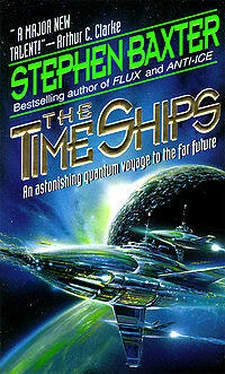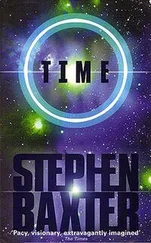…And then I found I was not blind: I did see something.
In some ways this was the queerest aspect of the whole journey so far. So queer, that at first I was quite beyond fear.
First of all I made out a lightening in the darkness. It was a vague, suffused brightening, something like a sun-rise, and so faint that I was unsure if my bruised eyes were not playing some trick on me. I thought I could see stars, all about me; but they were faint, their light tempered as if seen through a murky stained-glass window.
And now, by the dim glow, I began to see that I was not alone.
The creature stood a few yards before the Time Machine — or rather, it floated in the air, unsupported. It was a ball of flesh: something like a hovering head, all of four feet across, with two bunches of tentacles which dangled like grotesque fingers towards the ground. Its mouth was a fleshy beak, and it had no nostrils that I could make out. I noticed now that the creature’s eyes — two of them, large and dark — were human. It seemed to be making a noise — a low, murmuring babble, like a river — and I realized, with a stab of fear, that this was exactly the noise I had heard earlier in the expedition, and even during my first venture into time.
Had this creature — this Watcher, I labeled it accompanied me, unseen, on both my expeditions through time?
Of a sudden, it rushed towards me. It loomed up, no more than a yard from my face!
I was unhinged at last. I screamed and, regardless of the consequences, hauled at my lever.
The Time Machine tipped over — the Watcher vanished — and I was flung into the air!
I was left insensible: for how long, I cannot say. I revived slowly, finding my face pressed down against a hard, sandy surface. I fancied I felt a hot breath at my neck — a whisper, a brush of soft hair against my cheek — but when I moaned and made to get up, these sensations vanished.
I was immersed in inky darkness. It felt neither warm nor cold. I was sitting on some hard, sandy surface. There was a scent of staleness in the still air. My head ached from the bump it had received, and I had lost my hat.
I reached out my arms and cast about all around me. To my great relief, I was rewarded almost immediately by a soft collision with a tangle of ivory and brass: it was the Time Machine, pitched like me into this darkened desert. I reached out with both hands and fingered the rails and studs of the machine. It was tipped over, and in the dark I could not tell if it was damaged.
I needed light, of course. I reached for some matches from my pocket — only to find none there; like a blessed fool I had packed my entire supply into the knapsack! A moment of panic assailed me; but I managed to suppress it, and I stood, shaking, and walked to the Time Machine. I investigated it by touch, searching between the bent rails until I found the knapsack, still stowed secure under the saddle. Impatient, I pulled the pack open and rummaged through it. I found two boxes of matches and tucked them into my jacket pockets; then I took out a match and struck it against its box.
… There was a face, immediately before me, not two feet away, glowing in the match’s circle of light: I saw dull white skin, flaxen hair draping down from the skull, and wide, gray-red eyes.
The creature let out a queer, gurgling scream, and disappeared into the darkness beyond the glow of my light.
It was a Morlock!
The match burned down against my fingers and I dropped it; I scrabbled for another, in my panic almost dropping my precious box.
The sharp sulphur smell of the matches filled my nostrils, and I backed across the sandy surface until my spine was pressed against the brass rods of the Time Machine. After some minutes of this submission to terror I had the wit to retrieve a candle from my knapsack. I held the candle close to my face and stared into its yellow flame, ignorant of the warm wax which flowed over my fingers.
I gradually began to discern some structure in the world around me. I could see the tangled brass and quartz of the upturned Time Machine, sparkling in the candlelight, and a form — like a large statue, or a building — which loomed, pale and huge, not far from where I stood. The land was not completely without light. The sun might be gone, but in patches above me the stars still shone, though slid about by time from the constellations of my boyhood. There was no sign of our friendly moon.
In one part of the sky, though, no stars shone: in the west, protruding over the black horizon, there was a flattened ellipse, unbroken by stars, spanning fully a quarter of the sky. This was the sun, shrouded in its astonishing shell!
As I came out of my funk, I decided my first action should be to secure my passage home: I must right the Time Machine — but I would not do it in the dark! I knelt down and felt about on the ground. The sand was hard, the grains fine-packed. I dug into it with my thumb, and pushed out a little depression; into this improvised holder I popped my candle, confident that in a few moments sufficient wax would melt to hold it more firmly in place. Now I had a steady light to guide my operations, and my hands were free.
I set my teeth, drew my breath, and grappled with the weight of the machine. I wedged my wrists and knees under its framework, trying to wrestle the thing from the ground — its construction had been intended for solidity, not ease of handling — until, at last, it gave under my onslaught and tipped over. One nickel rod struck my shoulder, quite painfully.
I rested my hand on the saddle, and felt where its leather surface was scuffed by the sand of this new future. In the dark of my own shadow, I reached out and found the chronometric dials with my probing fingertips — one glass had shattered, but the dial itself seemed in working order — and the two white levers with which I could bring myself home. As I touched the levers, the machine shivered like a ghost, reminding me that it — and I — were not of this time: that at any moment now, of my choosing, I only had to board my device to return to the security of 1891, at the risk of nothing more than a little bruised pride.
I lifted the candle from its socket in the sand and held it over my dials. It was, I found, Day 239,354,634: therefore — I estimated — the year was A.D. 651,208. My wild imaginings about the mutability of past and fixture must be correct; for this darkened hill-side was located in time a hundred and fifty millennia before Weena’s birth, and I could not envisage a way in which that sunlit garden-world could develop from this rayless obscurity!
In my remote childhood, I remember being entertained by my father with a primitive wonder — toy called a “Dissolving View.” Crudely colored pictures were thrown onto a screen by a double-barreled arrangement of lenses. A picture would be projected first by the right-hand lens of the contraption; then the light would be shifted to the left-hand side, so that the picture cast from the right faded as the other grew in brightness. As a child I was deeply impressed by the way in which a bright reality turned into a phantom, to be replaced by a successor whose form was at first visible only as an outline. There were exhilarating moments when the two images were exactly in balance, and it was hard to determine which details were advancing and which were receding realities, or whether any part of the ensemble of images was truly “real.”
Thus, as I stood in that darkened landscape, I felt the sturdy description of the world I had constructed for myself growing misty and faint, to be replaced only by the barest bones of a successor, and with more confusion than clarity!
The divergence of the twin Histories I had witnessed — in the first, the building of the Eloi’s garden world; in the second, the extinguishing of the sun, and the establishment of this planetary desert — was incomprehensible to me. How could events be, and then not be?
Читать дальше
Конец ознакомительного отрывка
Купить книгу









